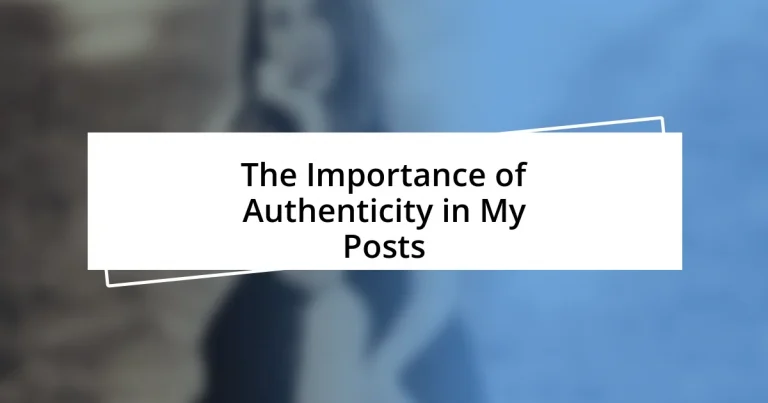Key takeaways:
- Authenticity fosters trust and connection, allowing audiences to relate to genuine experiences and build supportive communities.
- Sharing personal struggles, alongside successes, enhances credibility and encourages engagement from followers, creating a richer dialogue.
- Maintaining a consistent voice and striking a balance between vulnerability and oversharing are crucial for effective authentic content creation.
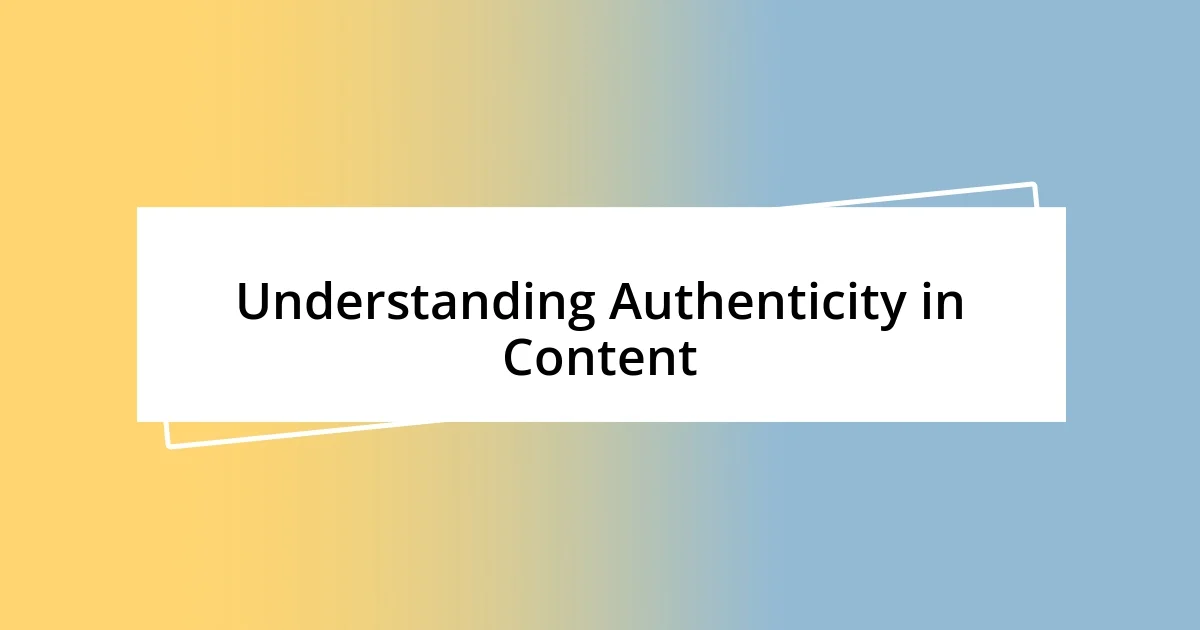
Understanding Authenticity in Content
Authenticity in content is about being true to oneself and expressing genuine thoughts and feelings. I remember a time when I strayed away from my voice to fit a trending topic. The feedback was quick and clear—my audience could sense that disconnect, and it taught me an invaluable lesson about the importance of staying true to my authentic self.
When I create content, I often ask myself, “What do I genuinely believe about this topic?” This simple question helps me navigate through the noise and ensures my work resonates with my audience. Authenticity isn’t just about honesty; it’s about vulnerability. It means sharing not just successes but also struggles and failures, allowing others to connect with the human experience behind the post.
I’ve found that readers crave realness—they want to feel something. They appreciate when I share moments of self-doubt or joy, as it makes the content relatable. Authenticity fosters trust; when I share my true thoughts, I invite readers into my world, creating a community where we can learn from each other. It’s about forging connections that are rooted in sincerity, and for me, that’s what keeps the dialogue alive.
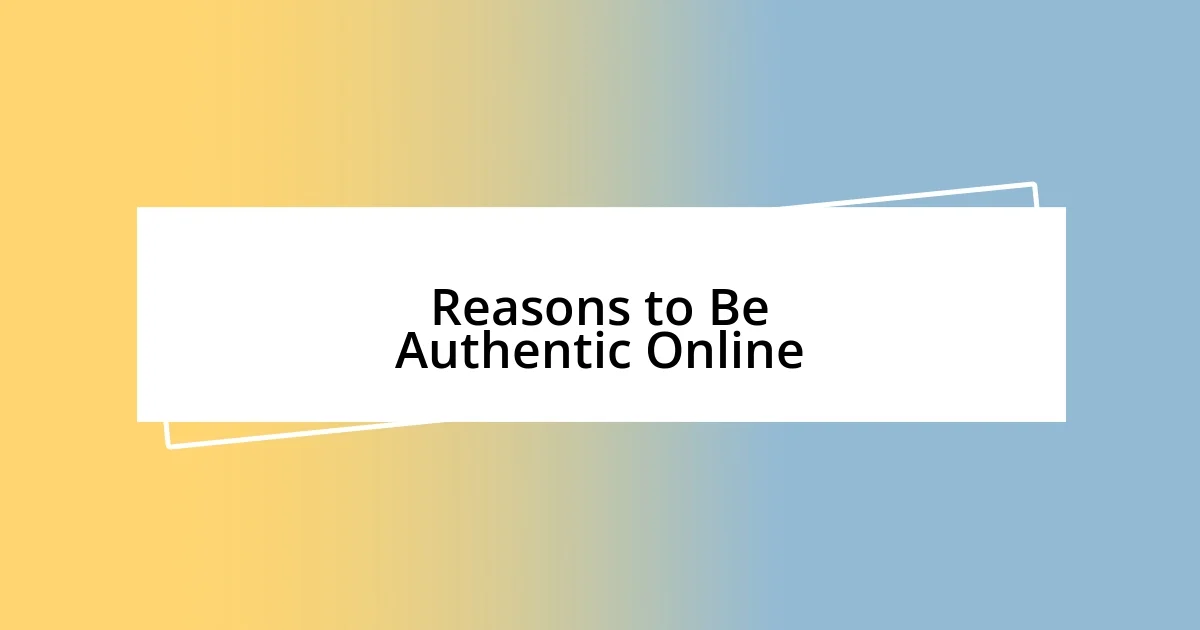
Reasons to Be Authentic Online
Being authentic online has a myriad of benefits that can shape both personal and professional landscapes. I’ve realized that when I share my unfiltered thoughts, I not only attract an audience but also build a loyal community. After sharing a post where I opened up about my struggles with imposter syndrome, I was overwhelmed by the supportive feedback. Many reached out, sharing their own vulnerabilities, which created a deeper bond. This exchange illustrated how authenticity can break down barriers and foster genuine connections.
Here are some compelling reasons to embrace authenticity in your online presence:
- Builds Trust: Audiences appreciate transparency, which can elevate your credibility.
- Encourages Engagement: Authentic posts tend to generate more interaction as people relate to your real experiences.
- Fosters Community: Vulnerability invites others to share their stories, creating a supportive environment.
- Differentiates Your Voice: In a sea of curated content, being real can set you apart from others.
- Enhances Personal Growth: Sharing your true thoughts can lead to introspection and self-improvement.
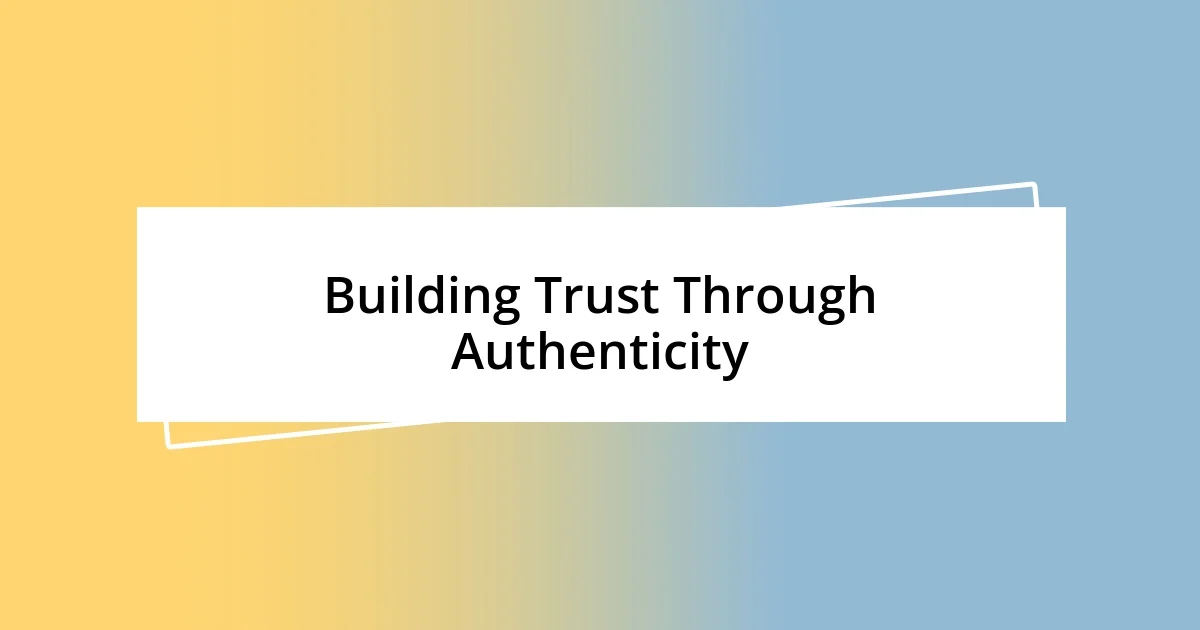
Building Trust Through Authenticity
Building trust through authenticity is a powerful principle I’ve learned in my journey. The more I share my true feelings and experiences, the more my audience seems to respond positively. For instance, when I decided to post about my challenges with mental health, I was astonished by the flood of messages from readers who felt the same. That openness cultivated trust, showing my followers that they weren’t alone in their struggles.
It’s intriguing how quickly authenticity can transform an audience’s perception. I recall an occasion when I wrote about a failed project, something I initially hesitated to share. However, once I hit ‘publish,’ I realized how many people reached out, thanking me for being honest. This incident taught me that imperfections and struggles can often create stronger bonds than only showcasing successes. In our journey toward building trust, embracing vulnerability can indeed be a game changer.
In my experience, I’ve noticed that when I am authentic, my engagement skyrockets. My readers want to know the real person behind the posts. It’s like having a two-way conversation instead of a monologue; I feel connected to a community that shares their perspectives. When authenticity is woven into our content, trust flourishes naturally, and the conversation becomes richer and more meaningful.
| Authenticity | Trust |
|---|---|
| Encourages genuine connections | Fosters loyalty from the audience |
| Invites vulnerability | Enhances credibility and transparency |
| Distinctive from curated content | Creates a supportive community |

Practical Ways to Showcase Authenticity
When it comes to showcasing authenticity, one practical approach I’ve found effective is sharing behind-the-scenes content. For instance, there was a time when I documented my preparation for a recent project, revealing both the excitement and the chaos that came with it. The responses were incredible; people appreciated seeing the raw, unfiltered process that often goes unnoticed. Isn’t it fascinating how exposing the struggles brightens the triumphs for others?
Another way to embody authenticity is through storytelling. I often share personal anecdotes that highlight my experiences—the good, the bad, and everything in between. For example, recounting my first attempt at public speaking, flubs and all, helped others feel less isolated in their fears. It really struck me how lives intertwine through shared narratives like this. Have you ever noticed how a simple story can connect hearts and minds in unexpected ways?
Incorporating audience interaction is essential, too. I make it a point to ask open-ended questions in my posts, inviting my followers to share their thoughts. After a recent post where I reflected on my journey with self-doubt, I invited others to share their similar experiences. The flood of stories that poured in not only enriched the conversation but reinforced a collective sense of authenticity. It made me realize: isn’t the exchange of genuine experiences what truly builds community?
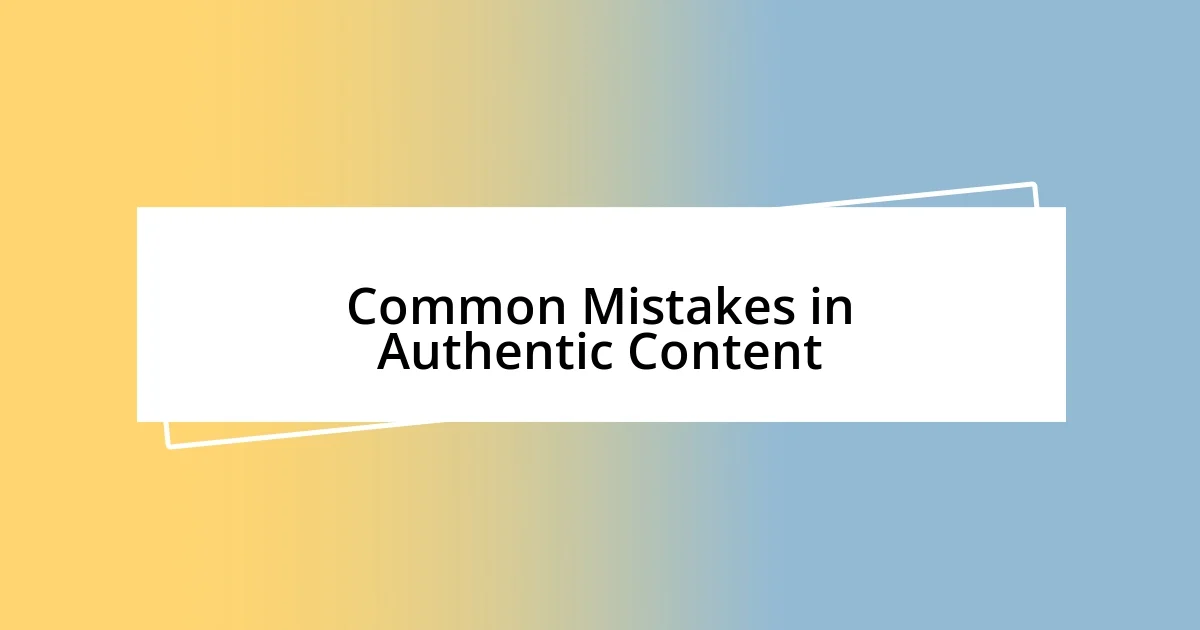
Common Mistakes in Authentic Content
One common mistake in creating authentic content is failing to maintain a consistent voice. I remember a time when I tried to mimic the style of a popular influencer, thinking it would increase my engagement. Instead, it felt forced, and my audience could sense the disconnect. So, I learned that staying true to my unique voice is vital; it fosters genuine connections, whereas imitation can create confusion and detachment.
Another pitfall is oversharing. While I truly believe that vulnerability can enhance authenticity, there have been moments when I shared too much too soon. I once delved deep into a tough personal issue without fully considering the emotional impact it might have on my readers. Ultimately, it’s important to strike a balance—inviting openness without overwhelming my audience. It’s about providing a safe space while still being selective with what I choose to reveal.
Lastly, many people forget the power of engagement in authenticity. I’ve found that simply sharing my thoughts isn’t enough; real conversation thrives on dialogue. When I post about my favorite book, for example, I make it a point to respond to comments and ask others for their thoughts and recommendations. This back-and-forth creates a genuine sense of community, rather than a one-sided monologue. Isn’t it invigorating to see how our discussions can flourish when we actively involve our audience?
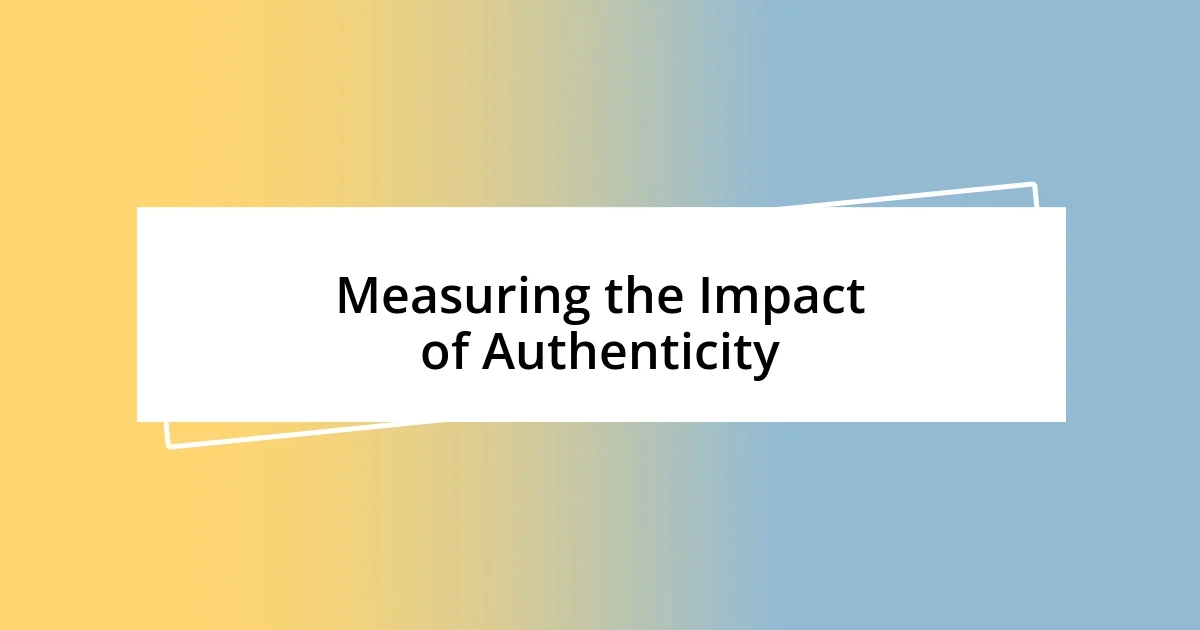
Measuring the Impact of Authenticity
Measuring the impact of authenticity in my posts is something I’ve come to appreciate over time. When I shared a heartfelt message about a personal setback, I noticed an uptick in engagement—likes, comments, and shares skyrocketed. It was as if my vulnerability resonated with my audience, proving that genuine emotions can create a ripple effect. Isn’t it intriguing how openness can foster such connection?
I often look at the quality of comments as a gauge for authenticity. After a post where I discussed the importance of self-compassion, many followers opened up about their own struggles, sharing moving stories. This kind of engagement makes me realize that authenticity goes beyond numbers; it cultivates a community where people feel safe to express themselves. How often do we underestimate the power of a single post to uplift and empower others?
Another measure I’ve found valuable is the feedback I receive from peers and mentors. Recently, a fellow content creator reached out to compliment how genuine and relatable my content felt. That validation reinforced my belief that authenticity not only attracts an audience but also cultivates respect among creators. Have you considered how your unique voice might inspire those around you?
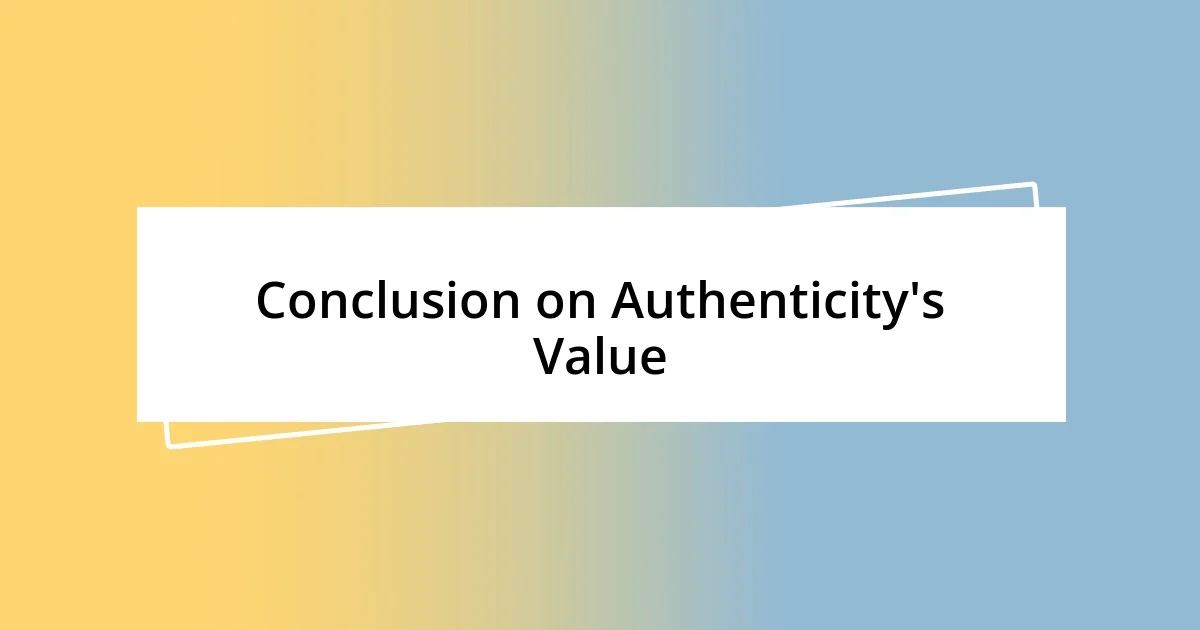
Conclusion on Authenticity’s Value
Authenticity isn’t just a buzzword; it profoundly shapes how we connect with others online. I once posted a simple photo from my weekend hike, paired with an honest reflection about navigating difficult times. It struck me how my followers reacted—many shared their own nature escapes and struggles. This experience reinforced my belief that when we’re ourselves, we invite others to do the same, creating a space where vulnerability and strength coexist.
Reflecting on my journey, I’ve learned that showing my flaws doesn’t undermine my credibility—it enhances it. I recall a moment when I confessed to struggling with imposter syndrome while trying to grow my online presence. Instead of shying away from those feelings, I shared them openly. The supportive responses I received filled me with warmth and solidarity, proving that authenticity fosters trust. Isn’t it remarkable how being genuine can turn a solitary experience into a collective one?
In the end, authenticity is invaluable because it fosters real connections that can transform our online interactions. When I think about the posts that resonated the most, they are the ones where I was completely honest and true to myself. Authenticity encourages a two-way dialogue that goes beyond mere likes and shares; it builds a community that thrives on mutual understanding and support. Have you considered how much more richly your online presence could flourish if you embraced your true self?












